Politics
Gaza, Iran-Israel conflict approaches point of no return: Erdoğan
Both the genocide in Gaza and the Israel-Iran conflict are rapidly approaching a point of no return, President Recep Tayyip Erdoğan said on Friday, criticizing Israel’s continued attacks on Gaza and the region.
“It is imperative that hands are taken off triggers in the Israel-Iran conflict before there is more destruction and civilian casualties,” the president said, speaking at the youth forum of the Organisation of Islamic Cooperation (OIC) in Istanbul.
Türkiye did not change its stance but continued to support the oppressed despite the Zionist lobbies’ attacks against the Turkish government and myself, he added.
“Israel, which complains about damage to its hospitals today, has so far carried out over 700 attacks on health care facilities in Gaza alone,” Erdoğan said, reminding that Gaza has been enduring “one of the most shameful acts of modern-day barbarism for 21 months.”
Erdoğan said: “The Islamic world is going through a difficult period, with war, conflict, instability casting a shadow over its entire geography.”
The Turkish president said the Netanyahu government is primarily responsible for the Gaza genocide, while those who stay silent in the face of these massacres are accomplices to his crimes.
“Those turning Gaza into the world’s largest concentration camp, speaking of war crimes, is not only inconsistent but shows shamelessness and impudence,” Erdoğan continued. “People standing in food distribution lines in Gaza for a piece of bread, a bowl of soup, are being brutally targeted.” He said that powers having influence over Israel “should not fall into Netanyahu’s game,” and should use their influence to establish a cease-fire and calm in the region.
Hostilities broke out last Friday when Israel launched airstrikes on several sites across Iran, including military and nuclear facilities, prompting Tehran to launch retaliatory strikes.
Israeli authorities said at least 25 people have been killed and hundreds injured since then in Iranian missile attacks.
Meanwhile, in Iran, 639 people have been killed and more than 1,300 wounded in the Israeli assault, according to Iranian media reports.
NATO member Türkiye has been a traditional ally to Palestine, but the more brutal Israeli attacks became, the harsher Ankara has made its criticism. It has condemned what it calls genocide, halted all trade with Israel and applied to join a genocide case against Israel at the World Court, which Israel rejects.
In addition to delivering humanitarian aid, the Turkish government has sought to rally international organizations, including the United Nations, NATO and the OIC, to both restrain Israel and encourage cooperation between Palestinian factions, most notably between Hamas and the Fatah movement.
Politics
Türkiye refutes claims of mass release of convicted PKK terrorists
Justice Minister Yılmaz Tunç on Wednesday firmly rejected claims circulating in the media that some 700 convicted members of the PKK would be released following the terrorist group’s decision to disband, calling the numbers “absurd” and “untrue.”
Speaking to the press following a ceremony in Ankara, Tunç addressed allegations regarding the release of individuals linked to the PKK following a ruling by the Constitutional Court.
“Some outlandish figures are being named, that 200 people have been released, and 700 people will be released. These are untrue,” Tunç said. “This is a matter that was carried out within the framework of our Constitutional Court’s decision, in terms of the balance of crime and punishment and criminal justice.”
The controversy stems from the Constitutional Court’s annulment of a provision under Articles 220 and 314 of the Turkish Penal Code, which allowed individuals who were not formal members of terrorist organizations to be punished both for their actions and as if they were members.
Tunç explained that the Turkish Parliament had not made any legislative adjustments in response to the court’s ruling, which had led to complications in ongoing judicial processes, particularly for individuals involved in protests or demonstrations.
“When a person participated in an illegal demonstration, they received a penalty under Law No. 2911. However, they were subject to separate punishment, as if they were members of the organization that organized the illegal demonstration,” Tunç said.
The Constitutional Court, he noted, found this dual punishment excessive for a single act and annulled the provision based on the principle of proportionality in criminal justice.
Tunç emphasized that affected individuals would still be held accountable for the crimes they committed, but could no longer be additionally charged as members of the organization unless they were proven to be such.
“The figures reported to the press are also incorrect,” he said. “Presenting it as ‘200 people, 700 people were released because they were members of the PKK’ leads to misunderstandings.”
Terror-free Türkiye
Tunç also addressed questions about the broader terror-free Türkiye initiative, stating that the disarmament and dissolution of the PKK remain critical goals for the government.
“The process regarding the terrorist organization’s disarmament is being monitored,” Tunç said. “This is being followed in full coordination with the relevant institutions of our state.”
The terrorist group, which led a bloody campaign of violence that killed at least 40,000 people over four decades, began laying down arms earlier this month.
Thirty members of the group burned their weapons at a ceremony in northern Iraq, and more are expected to abandon arms in the coming months.
Turkish intelligence monitors the process while Parliament will form a committee to weigh next steps in the initiative, from the fate of disarmed PKK members to their sentencing.
Tunç confirmed that efforts are underway to establish a commission in Parliament to support the process, with inter-party meetings and dialogue ongoing.
Tunç stressed that the government is conducting the process transparently and with sensitivity, ensuring that no steps are taken that would offend the families of martyrs or unsettle the public.
Meetings with the PKK-affiliated Peoples’ Equality and Democracy Party (DEM Party) at the Justice Ministry have been part of this process, Tunç confirmed. Issues raised, including those related to judicial practices, sick convicts and decisions by administrative boards, are being reviewed.
“Actions regarding these issues can already be taken within the framework of our legislation, and we are all closely monitoring the process,” he added.
Media outlets reported that full disarmament of the PKK may take up to five months, and the committee is expected to outline a road map for the reintegration of PKK members into society, possible leniency in sentencing of the group’s members and confidence-building measures for the integration of former members of the PKK not involved in acts of terrorism.
Reports say the initiative will also extend to PKK convicts and elderly, ill inmates convicted of membership in the terrorist group, who may benefit from leniency in their prison terms, pointing out existing laws for such convicts. But this will likely require the removal of the PKK’s status as a national threat to Türkiye’s existence, something that the National Security Council, chaired by the president, has the final say.
Politics
Türkiye, Arab countries condemn Israeli parliament’s call to annex West Bank
Türkiye, along with nine other countries of the Arab League and the Organisation of Islamic Cooperation (OIC) on Thursday, strongly condemned the Israeli Knesset’s approval of a so-called “Israeli sovereignty” over the West Bank.
The Turkish Foreign Ministry said in a statement that the parties, including Bahrain, Egypt, Indonesia, Jordan, Nigeria, Palestine, Qatar, Saudi Arabia and the United Arab Emirates, consider the declaration “a blatant and unacceptable violation of international law.”
It added that the declaration flagrantly breaches key U.N. Security Council resolutions 242 (1967), 338 (1973) and 2334 (2016), which reject all measures legitimizing the occupation, including settlements in Palestinian territories occupied since 1967.
The ministry said the parties “reaffirm that Israel has no sovereignty over the Occupied Palestinian Territory,” stressing that this unilateral Israeli move has no legal effect and cannot alter the legal status of the Occupied Palestinian Territory, particularly East Jerusalem, which remains an integral part of it.
The statement also emphasized that such Israeli actions “only fuel the growing tension in the region,” which has been exacerbated by the Israeli aggression on the Gaza Strip and the resulting humanitarian catastrophe in the Strip.
The parties call on the international community, including the Security Council and all relevant actors, to shoulder their legal and moral responsibilities, it added.
The ministry called for an end to “Israel’s illegal policies aimed at imposing a fait accompli by force,” undermining the prospects for a just and lasting peace, and the prospects of the two-state solution.
“They also reaffirm their commitment to the two-state solution based on international legitimacy and the Arab Peace Initiative,” the ministry added, also noting their support for the realization of an independent, sovereign Palestinian state on the June 4, 1967 lines, with East Jerusalem as its capital.
A day earlier, Ankara similarly condemned Israel’s actions. In a written statement issued Wednesday, the Foreign Ministry declared the resolution “null and void under international law and without any validity,” stressing that the West Bank is Palestinian territory that has remained under Israeli occupation since 1967.
The ministry criticized the move as part of broader efforts by Israel to undermine peace and destabilize the region.
“Any Israeli attempt at annexation is illegitimate and provocative,” the statement read, warning that Israel’s “violent policies and unlawful actions” are not only worsening the humanitarian crisis but also threatening international order and regional security.
Politics
Homeland Party dissolves at 2nd extraordinary congress
The Homeland Party (MP) of Muharrem Ince, a former presidential candidate who once challenged President Recep Tayyip Erdoğan, dissolved during its second extraordinary congress with the decision of a majority vote, the party said Tuesday.
At the congress, 277 delegates voted; 220 voted for closure, 55 voted against closure, and two votes were invalid. These votes resulted in the party’s closure.
MP Vice Chairperson Asuman Ali Güven said: “With today’s congress, we have completed a legal and political process. Our delegates, provincial and district chairs, party council members, and founders voted by a large margin to shut down our party.”
The decision came after Ince announced his return to the main opposition Republican People’s Party (CHP) last month during a meeting of the CHP’s parliamentary group, where party leader Özgür Özel welcomed him back, describing the move as a critical step toward opposition unity amid increasing political pressure from the ruling government.
Ince, 60, was the CHP’s nominee against Erdoğan in the 2018 presidential election, where he gained national prominence despite losing. He broke with the CHP in early 2021 after internal disputes and founded the MP that May, positioning it as an alternative to traditional opposition politics.
Ince’s MP failed to gain significant traction in national elections, drawing just 0.17% of the vote in the 2024 local polls. Despite stepping away from the CHP, Ince occasionally expressed support for the party, particularly in response to legal actions against its members, including Imamoğlu’s March 2024 arrest on corruption charges, which Ince publicly condemned.
Ince’s return is widely seen as part of Özel’s strategy to consolidate the opposition ahead of future elections, as the CHP seeks to build on its historic gains in the 2024 municipal races – the first time in 47 years the party emerged as Türkiye’s leading political force.
Politics
Istanbul once again serves as scene for Ukraine-Russia peace talks
Ukrainian and Russian officials will meet in Istanbul on Wednesday for the third round of peace talks, their first meeting in over seven weeks amid U.S. pressure to reach a cease-fire.
It is expected that both sides put forth their conditions to achieve peace and negotiate. The meeting will take place at the Çırağan Palace.
Ukraine announced that former Defense Minister and current Security Council Secretary Rustem Umerov would lead its delegation. The team includes those who have participated previously at the second round of talks with Russia.
The Kremlin said it would send political scientist Vladimir Medinsky to lead its negotiating team. It will also include Deputy Foreign Minister Mikhail Galuzin, Chief of the General Staff Main Intelligence (GRU) Igor Kostyukov and Deputy Defense Minister Aleksandr Fomin.
From the Turkish side, Foreign Minister Hakan Fidan, National Intelligence Organization (MIT) Chief Ibrahim Kalın and Chief of General Staff Metin Gürak will participate.
Russia stated that it expected the talks to be “difficult,” downplaying expectations of a breakthrough at a meeting between the two sides, following nearly three and a half years of war.
U.S. President Donald Trump last week gave Russia “50 days” to end the war or face sanctions, but the Kremlin has not indicated it is willing to compromise on its demands.
“No one expects an easy road,” Kremlin spokesperson Dmitry Peskov told reporters when asked about his expectations for the talks. “It will be very difficult,” he added.
Meanwhile, Ukraine hopes for a “constructive” stance from Russia.
Ukraine is ready to agree to a cease-fire with Russia at talks in Istanbul, but results from the meeting will depend on whether Russia takes a “constructive position,” a source in the Ukrainian delegation told Agence France-Presse (AFP).
“Everything will depend on whether Russia stops speaking in ultimatums and takes a constructive position. This will determine whether results can be achieved at this meeting,” the source told AFP.
At the last talks on May 16 and June 2, the two sides agreed to large-scale prisoner exchanges.
They also exchanged their draft terms for ending the conflict, which the Kremlin said were “diametrically opposed.”
President Recep Tayyip Erdoğan last month called on both sides not to “shut the door” on dialogue.
The rival sides met earlier in Istanbul on May 16 and June 2 amid U.S. pressure to agree on a cease-fire to end the three-year-old conflict. Despite the urging of U.S. President Donald Trump, no major breakthrough was made.
Ukrainian and Russian negotiators have so far only agreed to hold prisoner exchanges. And Russia has since launched intense air attacks on Ukraine and seized more frontline territory.
Russia has demanded that Ukraine give up four regions, on top of Crimea, which it annexed in 2014. The Kremlin also insists that Ukraine should abandon any plans to join the NATO military alliance.
Ukraine has rejected the demands and expressed doubt that Russia wants a cease-fire.
Ankara is keen on boosting its international profile as a key mediator and utilizes Istanbul’s symbolic location to promote diplomacy between the parties involved in conflicts and disagreements on a global level.
NATO member Türkiye is one of the most active countries working to ensure a permanent cease-fire between Ukraine and Russia. Its delicately balanced act of assuming a role as a mediator by keeping communication channels with both warring sides open provides a glimmer of hope in diplomatic efforts to find a solution and achieve peace in the Ukraine crisis. With its unique position of maintaining friendly relations with both Russia and Ukraine, Türkiye has garnered widespread praise for its efforts to end the war.
While Ankara has opposed international sanctions aimed at isolating Moscow, it has also closed its straits to prevent some Russian vessels from crossing through them.
Politics
Turkish Cyprus offers to help Greek Cypriots douse wildfires
The Turkish Republic of Northern Cyprus (TRNC) has extended an offer of assistance to the Greek Cypriot administration as wildfires rage across villages in Limassol.
TRNC President Ersin Tatar announced in a written statement on Wednesday that his administration had conveyed its willingness to assist through the United Nations Peacekeeping officials on the island.
He said they are closely following the situation and stand ready to provide help.
A fast-moving wildfire near the southern Cypriot city of Limassol has killed at least two people and forced widespread evacuations, local media said on Thursday.
The blaze broke out on Wednesday in a mountainous village about 20 kilometers (12 miles) north of Limassol and quickly spread, fanned by strong winds.
“We are all saddened by the fact that many settlements have had to be evacuated due to the forest fire that broke out today in villages of Limassol and remains uncontrolled,” Tatar said.
Highlighting the urgency of the disaster and the shared risk to human life and the environment, Tatar stressed that the offer of support is rooted in humanitarian responsibility.
“Our offer of support and assistance for firefighting has been delivered to the U.N.,” he said. “My special representative and technical committees coordinator has also contacted their Greek counterparts directly, informing them that equipment, personnel and technical support can be provided through the relevant technical committee mechanism if needed. They have stated that our teams are on standby.”
Tatar said he hopes that the fires will soon be brought under control and extended his best wishes to those affected.
The fire forced the evacuation of 14 villages along a 14-kilometer (8.7-mile) stretch of mountainous terrain.
Media reports showed gutted homes smoldering as flames swept through the outskirts of some villages. In the village of Lofou, at least 20 homes were destroyed as fires threatened a group of stranded evacuees whose police buses had to turn back as the fire front shifted to block their exit.
Images broadcast on media late Wednesday showed flames consuming trees, brush and other vegetation along a huge front burning bright orange against the backdrop of a nighttime sky.
Police continued to block road access to the fire-afflicted communities as area residents vented against what they called a disorganized response to the huge fire.
Southern areas on the island have been on high alert for fires this summer after three consecutive arid winters.
Cyprus has been split between the Greek and Turkish Cypriot communities since 1974, when a Greek Cypriot coup aimed at Greece’s annexation of the island led to Türkiye’s military intervention as a guarantor power to protect Turkish Cypriots from persecution and violence in Cyprus. As a result, the TRNC was founded in 1983.
Greek Cypriots control the southern part of the island and are recognized by the international community as a state, despite protests from Turkish Cypriots and Türkiye. The TRNC is located in the northern part of the island and is recognized only by Türkiye.
It has seen an on-and-off peace process in recent years, including a failed 2017 initiative in Switzerland under the auspices of guarantor countries Türkiye, Greece and the U.K.
The Greek Cypriot administration entered the EU in 2004, the same year that Greek Cypriots single-handedly blocked a U.N. plan to end the longstanding dispute
Politics
Cease-fire key to peace at Türkiye-Russia-Ukraine talks: Fidan
Turkish Foreign Minister Hakan Fidan opened Wednesday’s third Türkiye-Russia-Ukraine Trilateral Meeting at Istanbul’s historic Çırağan Palace with a clear message: “The ultimate goal is to build a path to peace through a cease-fire.”
His remarks set the tone for an intense two-hour session aimed at advancing negotiations to end the protracted Russia-Ukraine war that began in February 2022.
High-level delegations from Russia and Ukraine joined Türkiye’s diplomatic, intelligence, and military leaders – including National Intelligence Organization head İbrahim Kalın and Chief of General Staff General Metin Gürak – underscoring Türkiye’s pivotal role as a NATO member trusted by both Moscow and Kyiv.
The conflict has exacted a heavy toll, with U.N. estimates reporting over half a million casualties and millions displaced as of mid-2025.
Türkiye has played a key mediation role from the onset, hosting initial talks in 2022 and facilitating the Black Sea Grain Initiative to enable Ukrainian grain exports.
The trilateral talks resumed this year after renewed diplomatic momentum driven by U.S. President Donald Trump and Turkish President Recep Tayyip Erdoğan, both maintaining direct communication with Russian President Vladimir Putin and Ukrainian President Volodymyr Zelenskyy.
The military stalemate persists, with Russia holding approximately 20% of Ukrainian territory, including Crimea and parts of Donbas, while Ukraine struggles with setbacks in eastern regions like Donetsk.
Both sides express cautious willingness to negotiate, pressured by ongoing battlefield deadlock and mounting economic strains.
At the heart of Wednesday’s talks were three key areas. Ukraine pressed for a comprehensive 30-day cease-fire paired with full territorial restoration and security guarantees, while Russia sought a long-term peace framework contingent on Ukraine’s non-alignment with NATO and relief from Western sanctions.
Both sides presented updated cease-fire proposals, delegating technical teams to refine terms ahead of future discussions. Fidan stressed the urgent need for “concrete steps” to end hostilities that have devastated Ukraine’s infrastructure and imposed significant costs on Russia’s economy.
Humanitarian issues, including prisoner exchanges and the return of Ukrainian children forcibly taken to Russia, were central to the dialogue.
Building on a 1,000-for-1,000 swap earlier this year, Ukraine proposed expanding exchanges to include injured soldiers and young conscripts, aiming for up to 6,000 prisoners returned.
Russia agreed to review these proposals, with both parties reaffirming commitment to easing human suffering.
The safety of the Zaporizhzhia Nuclear Power Plant also drew focus, with agreement to pursue demilitarization talks to reduce risks of a potential disaster.
Another critical topic was the potential leaders’ summit, envisioned to bring Putin, Zelenskyy, and possibly Trump together in Türkiye later this summer.
Fidan described the summit as a “critical step” to elevate peace talks to the highest level, highlighting Erdoğan’s rare trust with both leaders.
Zelenskyy expressed readiness to meet Putin if Moscow shows “serious intent,” though Russia prefers to continue lower-level negotiations until groundwork is laid.
Trump’s tentative willingness to attend adds diplomatic momentum amid ongoing logistical challenges.
Fidan also expressed cautious optimism, stating, “Peace is possible if both sides remain committed to dialogue.” Ukrainian and Russian officials echoed the sentiment of tangible progress, while the White House confirmed Trump’s openness to participate in the summit.
-
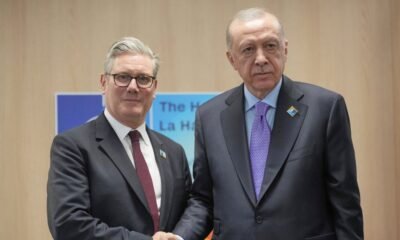
 Economy2 days ago
Economy2 days agoErdoğan, Starmer discuss Eurofighter procurement, trade deal update
-
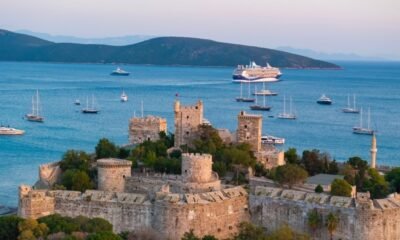
 Lifestyle2 days ago
Lifestyle2 days agoBodrum unveiled: Timeless escape on Türkiye’s turquoise coast
-
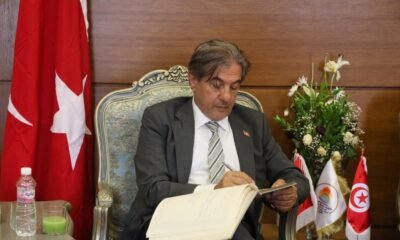
 Economy3 days ago
Economy3 days agoTurkish envoy highlights Tunisia’s role as ‘gateway’ to Africa
-
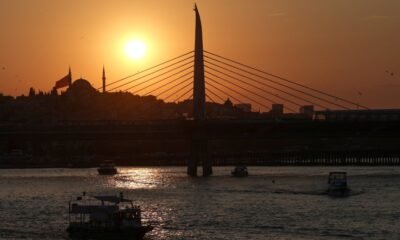
 Economy2 days ago
Economy2 days agoTürkiye secures $2.8B in green financing for rail to Nakhchivan
-

 Daily Agenda2 days ago
Daily Agenda2 days agoThe wind of defense will blow in IDEF 2025 today: hundreds of companies from 96 countries will participate
-

 Daily Agenda1 day ago
Daily Agenda1 day agoLast minute … Justice Minister Yilmaz Tunç: 200 people were released allegations lie!
-

 Daily Agenda2 days ago
Daily Agenda2 days agoRed Bulletin wanted with 407 criminals returned to Türkiye
-
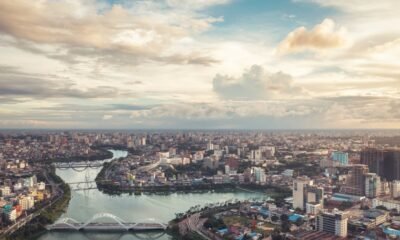
 Lifestyle1 day ago
Lifestyle1 day agoJourney through Bangladesh’s green heart to world’s longest beach




